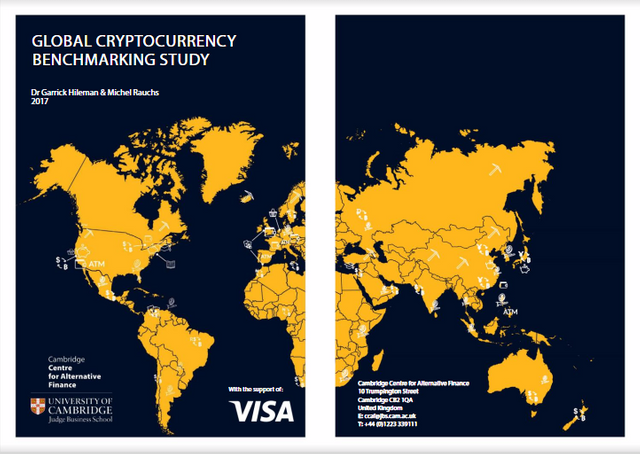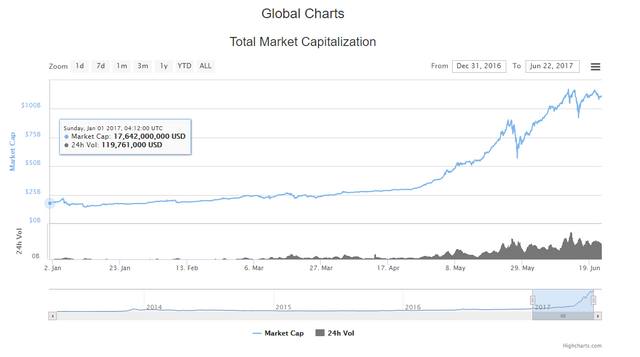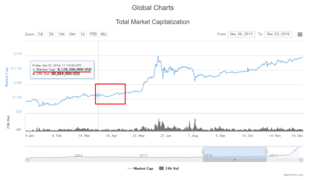The Elephant in the Room: Is Bitcoin in a Bubble?
Let’s address the elephant in the room: Is Bitcoin in a bubble?

We have all seen the charts of the last few months. We are all thinking about it. But let’s examine the situation a little closer. At a glance, it’s hard to argue the point that there is a bubble forming. I mean come on, we can all see it... Right? But if you closely examine the last few months a new pattern emerges that tells a different story.
Right around the time I was looking to join the cryptocurrency world I read an article about a new study published by the University of Cambridge Judge Business School titled "Global Cryptocurrency Benchmarking Study." To summarize their findings, they estimated number of unique active users to be as few as 2.9 million or as many as 5.8 million. By the time this study made the news those numbers were already starting to climb at an unprecedented level. The study was obsolete by the time it was published and reported on by the major media outlets because the market was starting to take off. The market cap during the month of April had grown from around $25 billion to $45 billion for an unbelievable 56% gain in a single month! Since that article was posted the market has exploded with growth and is sitting at $110 billion today.

However, not only has the market cap has grown, the number of new users flooding into the system is at an all-time high. Since the Cambridge study was posted, the number of cryptocurrency users has tripled within a matter of two months! Services like Coinbase, Poloniex, and Bittrex are struggling to keep up with the influx of new customers and we have all seen the consequences. Support ticket response times have gone up from a few hours to days and weeks, wallets are being frozen due to insane levels of network traffic, and the transaction costs are sky rocketing.
ICO's are selling out in record time and with record funding levels. And it is becoming harder and harder to distinguish between a DDoS attack and a very successful crowdsale lately. The Ethereum and Bitcoin networks are congested daily now and forget about ICO days when very popular companies hold their crowdsales. Just look at the last few big ICO’s like Bancor, Status.im, and Civic and the influence they have over the markets.
Greed is the driving force of the market. I don't mean to say that greed is bad, on the contrary greed can be a very positive force. After all, greed is one of the driving forces of capitalism. Reckless greed is dangerous and we all know the difference. We all know when we are taking a risk for the sake of a win or a profit that is not worth it. Don't tell me you don't have a memory of watching the bulls drive up a coin you have no faith in and then jumping in with them to chaise that quick pay off and getting burned. We all know the situation and the risk, but we do it anyways. Sometimes it pays off and other times we kick ourselves in the butt for a day or two for getting so overzealous in our pursuit of profit. We know better than to play with fire and yet we keep getting burned.
So, what is causing the bubble effect? Who to blame?
We all want someone to blame just in case this all goes belly up. But who is the culprit? Are crazy ICO's to blame? Greedy traders? Pump and dump groups? Ethereum and Bitcoin? There is no simple answer to this question, but I will do my best to give you something to chew on for a bit. Feel free to tear apart my opinion in the comments on this.
Look at where Bitcoin was in April of 2016, just a little over a year ago. Notice anything strange? Yep, that’s right! The entire cryptocurrency market was hovering below $8 billion! And what happened to cause it to start growing? Well at the risk of sounding like an American exceptionalist, I am making the claim that the reason the cryptocurrency world started growing is the political instability that began with the 2016 American Presidential Election cycle.
Those of you who are from United States know how vicious this last election cycle has been. We are still dealing with the consequences of the extremely polarized political parties. The instability of the United States political election process has caused many ripples around the global financial world. Because of the destabilization of the American political system, the cryptocurrency world has exploded with interest and lit a new fire in the heart of the blockchain industry which was seeing a declining market up until the primaries kicked into gear and the election presidential process began.
In 2016 the overall market capitalization grew from $7 billion to $17.5 billion by the years end. That’s 250% annual growth! Starting in January of this year the market cap has exploded to gain over 629% in just six months! In my opinion, this is no coincidence and not a runaway market. This is a clear sign that people are frustrated with the politicians who destabilize our world and are looking for a new way to secure a financial future that is not influenced by their national economic system. People are sick of watching corruption grow and their financial future start to grow dimmer with each new political scandal playing out in the news.

What I am getting at is that while there is a lot of fear-mongering out there about the cryptocurrency world collapsing. A great apocalypse when the markets will crash and all our money will turn to ash. So many voices echoing each other in the tunnel of doubt and fear. I am not here to discuss government and bank conspiracies, but we all should be aware of the heavy use of fear based politics in the media these days. These tactics are as old as the idea of politics itself and will continue to be a powerful force in any emerging market.
This is not the beginning of the end. I believe the market will continue to grow despite what the financial forecasters are predicting. People that say this will never last are the same type of people who thought the internet was a scam in the '90's. In my opinion, this is the beginning of mass adoption.


Increasing political turmoil in the U.S. certainly increases the opportunity value for blockchain applications. I don't think the crypto-space itself is in a bubble but given what happened with Ethereum yesterday it's safe to say that we're not invulnerable to bubble-like bursts that inevitably incur discussion over whether or not we're in a bubble.
We are not in:
This has only just began: https://steemit.com/bitcoin/@wekkel/bitcoin-in-a-bubble-no-way
Bitcoin would need to go beyond $15k this year before I start to feel a little bubbly, but only as an intermediate bubble in the much larger scheme of things (the mega run-up that will last a lot longer).
Thanks for the long write-up.